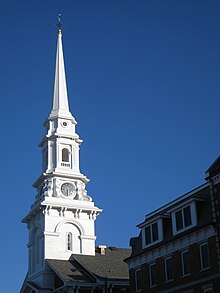
| Part of a series on |
| Reformed Christianity |
|---|
 |
|
|
Congregationalism in the United States consists of Protestant churches in the Reformed tradition that have a congregational form of church government and trace their origins mainly to Puritan settlers of colonial New England. Congregational churches in other parts of the world are often related to these in the United States due to American missionary activities.
Congregational churches have had an important impact on the religious, political, and cultural history of the United States. Congregational practices concerning church governance influenced the early development of democratic institutions in New England. Many of the nation's oldest educational institutions, such as Harvard University, Bowdoin College and Yale University, were founded to train Congregational clergy. Congregational churches and ministers influenced the First and Second Great Awakenings and were early promoters of the missionary movement of the 19th century. The Congregational tradition has shaped both mainline and evangelical Protestantism in the United States. It also influenced the development of American Unitarianism and Unitarian Universalism.
In the 20th century, the Congregational tradition in America fragmented into three different denominations. The largest of these is the United Church of Christ, which resulted from a 1957 merger with the Evangelical and Reformed Church. Congregationalists who chose not to join the United Church of Christ founded two alternative denominations: the National Association of Congregational Christian Churches and the Conservative Congregational Christian Conference.
© MMXXIII Rich X Search. We shall prevail. All rights reserved. Rich X Search
